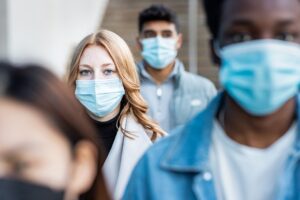
As the virus that causes COVID-19, SARS-CoV-2 keeps evolving, as has the information about reinfection risk.
The old knowledge says that if you catch COVID, you’re safe from reinfection for a while. However, new variants have thrown that thinking to the wayside. Since the omicron variant stepped on the scene in November, the rules have changed.
Currently, North America is seeing a surge of COVID-19 cases caused by the BA.4 and BA.5 omicron variants, which seem particularly adept at bypassing the body’s defenses against infection. The result is that it’s no longer uncommon to be reinfected and get COVID.
There are plenty of examples these days of people infected two or three times.
The good news is that although the newer variants spread much more quickly, they do not appear to be more severe forms of the disease.
More good news is that vaccination remains highly effective against preventing severe illness, hospitalization, and death. Depending on where you live, first and second booster shots are available.
Some may have just become eligible for a first or second booster (you can get it 5 months after a previous shot) and are wondering if it will impact their ability to get the omicron-specific shot that is projected to arrive in the fall.
Specialists are saying that it will not, so if you are on the fence, you may as well get a booster to help protect yourself against the current surge.
It may also be a good idea to adopt some of the preventative measures that were used during earlier COVID waves. Try to have your social gatherings outdoors or in well-ventilated spaces.
Many areas have relaxed mask rules. However, that doesn’t mean you should abandon yours. You’re encouraged to wear it in crowded indoor settings – movies, malls, transit, etc. to reduce the risk of transmission.